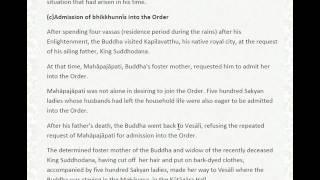Buddhist Lectures & Dhamma talks by Buddhadasa Bhikkhu for international students spoken in or interpreted into English and given at Suan Mokkh, Chaiya, South Thailand, in the years 1982-1991. As these were given at the end of his life, they often focus on core concerns of Buddha-Dhamma.
Get his book: https://amzn.to/2t3dNyq
Visit the Temple of Suan Mokkh
https://suanmokkh.org
Shot in Phoenix, AZ
Pyramid Trail
Camera:
https://amzn.to/306iyTX
My Favorite Buddhism book
https://amzn.to/2tNMfNG
PALI WORDS
Anattā, not-self
Aniccaṃ, impermanent, not-lasting, transient
Anusaya, tendencies: familiarity with defilement
Arahant, worthy one, one far from defilement
Ārammaṇa, sense objects
Ariya-sacca, noble truth, ennobling realities
Attā, ‘self,’ ego, substantial soul
Avijjā, ignorance, not-knowing, wrong knowledge
Ānāpānasati, mindfulness with breathing in and out
Citta, mind, heart, psyche: that which thinks, knows, and experiences.
Dhamma, truth, nature, law, natural truth, duty, order,
Dukkha, distress, anguish, suffering, misery,
Idappaccayatā, conditionality: everything is conditioned by and depends upon other conditioned things.
Khandha, aggregates, groups, bundles
Karuṇā, compassion
Kilesa, defilements, impurities: the harmful thoughts and emotions that tarnish, dirty, and pollute mind
Manussa, human being, high-minded being
Nibbāna, coolness, quenching: the Supreme, the ultimate reality in Buddhism
Nīvaraṇa, hindrances, obstacles
Paññā, wisdom, penetrating insight
Paṭicca-samuppāda, dependent co-arising
Phassa, the meeting and working together of sense organ
Sampajañña, wisdom-in-action,
Samādhi, concentration, collectedness,
Saṅkhāra, concoction, conditioned thing,
Saññā, recognition, classification, evaluation, perception
Sati, mindfulness, attention, awareness
Sati-paññā, mindfulness and wisdom
Suññata, emptiness, voidness
Tathatā, thusness, suchness, just-like-that-ness
Tilakkhaṇa, three marks of existence:
Upādāna, clinging, attachment, grasping
Vedanā, feeling: the mental response to or affective tone of sense experience
Viññāṇa, consciousness: knowing sense objects through the six doors
Vitakka, thought conception, thinking.
Vicāra, experiencing a thought-object or theme.
Get his book: https://amzn.to/2t3dNyq
Visit the Temple of Suan Mokkh
https://suanmokkh.org
Shot in Phoenix, AZ
Pyramid Trail
Camera:
https://amzn.to/306iyTX
My Favorite Buddhism book
https://amzn.to/2tNMfNG
PALI WORDS
Anattā, not-self
Aniccaṃ, impermanent, not-lasting, transient
Anusaya, tendencies: familiarity with defilement
Arahant, worthy one, one far from defilement
Ārammaṇa, sense objects
Ariya-sacca, noble truth, ennobling realities
Attā, ‘self,’ ego, substantial soul
Avijjā, ignorance, not-knowing, wrong knowledge
Ānāpānasati, mindfulness with breathing in and out
Citta, mind, heart, psyche: that which thinks, knows, and experiences.
Dhamma, truth, nature, law, natural truth, duty, order,
Dukkha, distress, anguish, suffering, misery,
Idappaccayatā, conditionality: everything is conditioned by and depends upon other conditioned things.
Khandha, aggregates, groups, bundles
Karuṇā, compassion
Kilesa, defilements, impurities: the harmful thoughts and emotions that tarnish, dirty, and pollute mind
Manussa, human being, high-minded being
Nibbāna, coolness, quenching: the Supreme, the ultimate reality in Buddhism
Nīvaraṇa, hindrances, obstacles
Paññā, wisdom, penetrating insight
Paṭicca-samuppāda, dependent co-arising
Phassa, the meeting and working together of sense organ
Sampajañña, wisdom-in-action,
Samādhi, concentration, collectedness,
Saṅkhāra, concoction, conditioned thing,
Saññā, recognition, classification, evaluation, perception
Sati, mindfulness, attention, awareness
Sati-paññā, mindfulness and wisdom
Suññata, emptiness, voidness
Tathatā, thusness, suchness, just-like-that-ness
Tilakkhaṇa, three marks of existence:
Upādāna, clinging, attachment, grasping
Vedanā, feeling: the mental response to or affective tone of sense experience
Viññāṇa, consciousness: knowing sense objects through the six doors
Vitakka, thought conception, thinking.
Vicāra, experiencing a thought-object or theme.
- Category
- Dhamma Talks in English
Be the first to comment











